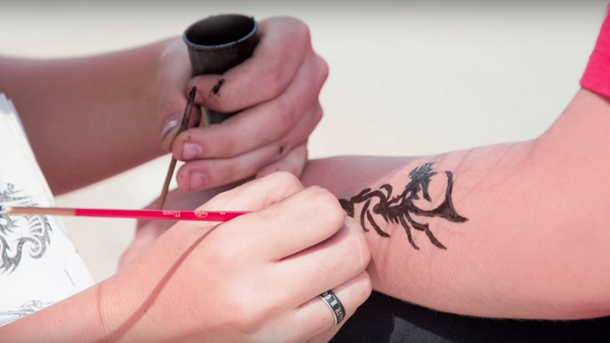Black henna temporary tattoo? The skin damage could be permanent…

The concern is over the use of an ingredient that is deemed perfectly safe for use in hair dyes but that should not be used in skin contact products.
The confusion begins as the word ‘henna’ is mentioned, though the BHTTs are not based on this practice at all.
Henna or not..?
Henna is a green plant powder that is mixed with water and turns brown in a few hours, often used for cosmetics purposes in Asia and Africa.
Black henna is not derived from the plant but a substance called para-phenylenediamine (PPD) which is found in hair dyes. PPD is allowed for use in hair dyes, but use in skin contact products such as temporary tattoos is illegal in the EU.
This is because, according to the BSF and CTPA, when PPD is used on the skin in this way it can cause blistering, painful skin burns and may even lead to scarring.
It can also leave the person with a lifelong sensitivity to PPD, which increases the risk of a severe allergic reaction when using hair dye in the future.
As such, the BSF has warned against getting a BHTT with Dr Anjali Mahto, Consultant Dermatologist & British Skin Foundation Spokesperson saying, “Black henna is well known to cause skin reactions and should be treated with caution, particularly in children.”
As the UK trade association, the CTPA has backed this warning stating that having a ‘black-henna’ temporary tattoo presents a significant risk of a very nasty adverse reaction to the tattoo itself.
“It also increases the risk of either not being able to use most hair dyes in the future or having a bad reaction to them if the warnings are ignored,” says Dr Christopher Flower, Director-General CTPA.
“This summer, parents will want to keep their children safe, by steering clear of so-called ‘black-henna’ temporary tattoos.”
The survey says…
As part of its campaign to raise awareness, the British Skin Foundation carried out a survey finding that 4 out of 10 dermatologists asked had seen patients with skin reactions to BHTTs, and that 1 in 20 dermatologists approached said that over 80% of the BHTT reactions they had seen were in children aged under 16.
They also confirmed that around half of the patients got a BHTT outside of the EU, where the legal status of PPD is not always clear; however the other half got a BHTT within the EU, with 27% of these in the UK.
About two-thirds of dermatologists approached have seen an increase in patients with reactions to hair dyes, many of whom have previously had a BHTT, says the BSF.
















